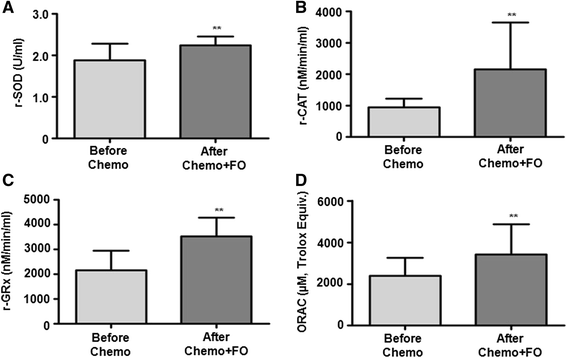Improved antioxidant status by omega-3 fatty acid supplementation in breast cancer patients undergoing chemotherapy: a case series
- PMID: 26104023
- PMCID: PMC4486087
- DOI: 10.1186/s13256-015-0619-3
Improved antioxidant status by omega-3 fatty acid supplementation in breast cancer patients undergoing chemotherapy: a case series
Abstract
Introduction: Breast cancer is the second leading cause of cancer death in women worldwide and the third most common cancer in India. Various studies have reported that chemotherapy reduces the antioxidant status in patients with cancer. A diet rich in omega-3 fatty acids has been shown to offer protection against breast cancer through various mechanisms. However, there are no reports suggesting a relationship between consumption of omega-3 fatty acids during chemotherapy and antioxidant status in patients with breast cancer. Thus, the objective of this study was to evaluate whether fish oil supplementation could improve the antioxidant status of five women with breast cancer undergoing chemotherapy.
Case presentation: We report on the cases of five Indian women with breast cancer, in the age group of 34 to 60 years, who had poorly differentiated breast carcinoma and underwent modified radical mastectomy. Postsurgery, the patients were given fish oil capsules containing eicosapentaenoic acid (180 mg) and docosahexaenoic acid (120 mg)/capsule during their chemotherapy. Informed consent was obtained from each participant and they were followed-up to the completion of six chemotherapy cycles at 21-day intervals.
Conclusions: The supplementation of fish oil significantly (p < 0.01) increased superoxide dismutases, glutathione reductase and catalase activity in red blood cells as well as the total plasma antioxidant status in the patients. This approach of using omega-3 fatty acids as an adjuvant treatment for breast cancer may help oncologists to manage the side effects of ongoing chemotherapy by improving the antioxidant status in patients.
Figures

Similar articles
-
Effect of randomized supplementation with high dose olive, flax or fish oil on serum phospholipid fatty acid levels in adults with attention deficit hyperactivity disorder.Reprod Nutr Dev. 2005 Sep-Oct;45(5):549-58. doi: 10.1051/rnd:2005045. Reprod Nutr Dev. 2005. PMID: 16188207 Clinical Trial.
-
Relationship of omega-3 and omega-6 fatty acids with semen characteristics, and anti-oxidant status of seminal plasma: a comparison between fertile and infertile men.Clin Nutr. 2010 Feb;29(1):100-5. doi: 10.1016/j.clnu.2009.07.008. Epub 2009 Aug 8. Clin Nutr. 2010. PMID: 19666200
-
Blood docosahexaenoic acid and eicosapentaenoic acid in vegans: Associations with age and gender and effects of an algal-derived omega-3 fatty acid supplement.Clin Nutr. 2015 Apr;34(2):212-8. doi: 10.1016/j.clnu.2014.03.003. Epub 2014 Mar 14. Clin Nutr. 2015. PMID: 24679552
-
Omega-3 fatty acids for breast cancer prevention and survivorship.Breast Cancer Res. 2015 May 4;17(1):62. doi: 10.1186/s13058-015-0571-6. Breast Cancer Res. 2015. PMID: 25936773 Free PMC article. Review.
-
Risk stratification by the "EPA+DHA level" and the "EPA/AA ratio" focus on anti-inflammatory and antiarrhythmogenic effects of long-chain omega-3 fatty acids.Herz. 2004 Nov;29(7):673-85. doi: 10.1007/s00059-004-2602-4. Herz. 2004. PMID: 15580322 Review.
Cited by
-
The effects of EPA and DHA enriched fish oil on nutritional and immunological markers of treatment naïve breast cancer patients: a randomized double-blind controlled trial.Nutr J. 2017 Oct 23;16(1):71. doi: 10.1186/s12937-017-0295-9. Nutr J. 2017. PMID: 29061183 Free PMC article. Clinical Trial.
-
Understanding the Role of Polyunsaturated Fatty Acids in the Development and Prevention of Cancer.Cancer Treat Res. 2024;191:57-93. doi: 10.1007/978-3-031-55622-7_3. Cancer Treat Res. 2024. PMID: 39133404 Review.
-
N-3 Long-Chain Polyunsaturated Fatty Acids, Eicosapentaenoic and Docosahexaenoic Acid, and the Role of Supplementation during Cancer Treatment: A Scoping Review of Current Clinical Evidence.Cancers (Basel). 2021 Mar 10;13(6):1206. doi: 10.3390/cancers13061206. Cancers (Basel). 2021. PMID: 33801979 Free PMC article.
-
Dietary Guidelines for Breast Cancer Patients: A Critical Review.Adv Nutr. 2017 Jul 14;8(4):613-623. doi: 10.3945/an.116.014423. Print 2017 Jul. Adv Nutr. 2017. PMID: 28710147 Free PMC article. Review.
-
Differential Ratios of Omega Fatty Acids (AA/EPA+DHA) Modulate Growth, Lipid Peroxidation and Expression of Tumor Regulatory MARBPs in Breast Cancer Cell Lines MCF7 and MDA-MB-231.PLoS One. 2015 Sep 1;10(9):e0136542. doi: 10.1371/journal.pone.0136542. eCollection 2015. PLoS One. 2015. PMID: 26325577 Free PMC article.
References
-
- Aggarwal BB, Ichikawa H, Garodia P, Weerasinghe P, Sethi G, Bhatt ID, et al. From traditional Ayurvedic medicine to modern medicine: identification of therapeutic targets for suppression of inflammation and cancer. Expert OpinTher Targets. 2006;10(1):87–118. doi: 10.1517/14728222.10.1.87. - DOI - PubMed
-
- Deshpande R, Mansara P, Suryavanshi S, Kaul-Ghanekar R. Alpha-linolenic acid regulates the growth of breast and cervical cancer cell lines through regulation of NO release and induction of lipid peroxidation. J Mol Biochem. 2013;2(1):6–17.
-
- Norman HA, Butrum RR, Feldman E, Heber D, Nixon D, Picciano MF, et al. The role of dietary supplements during cancer therapy. J Nutr. 2003;133(11 Suppl 1):3794S–9. - PubMed
Publication types
MeSH terms
Substances
LinkOut - more resources
Full Text Sources
Other Literature Sources
Medical

